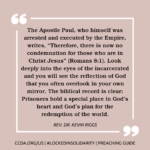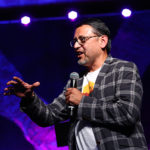Later this month, I’ll be taking a long walk. While I won’t be able to participate in the full eleven-day journey, I’ll be joining the final few days of El Camino del Inmigrante; a walk from the US-Mexico border up to Downtown Los Angeles, where CCDA’s annual conference will take place this year.
I’m walking for several reasons.
I’m walking because, more than ten years ago, as a senior in college, I met a young man from Rwanda. His name was Denis, and he had been admitted into the United States as a refugee and resettled by World Relief. Denis and his family became my friends, and taught me a lot about the plight of refugees—individuals forced to flee their country because of persecution—both globally and in the suburban Chicago community where I lived. I very quickly realized how little I knew.
A few months later, with only nebulous ideas about the future as I graduated from college, I rented an apartment in Denis’ apartment complex. My new neighbors were primarily immigrants—individuals from more than twenty different countries. Many were refugees whom World Relief had resettled—particularly from Somalia, Burma, Liberia, Burundi, and Iran—but many others were individuals and families from the Mexican states of Guerrero, Michoacán, and Jalisco. Some of them had legal status, but over time, as trust developed, I learned that many others did not.
Over repeated servings of posole and chilaquiles, I listened to the stories of how my neighbors risked everything at moments of utter desperation to make it to the U.S. Walking through deserts. Sometimes with children in tow. Sometimes with children left behind. “We were down to tortillas and salt,” one told me, deeply indebted as the money borrowed for school fees compounded with the loan shark. Through tears, my friend explained that she felt she had no other choice but to find work in the US.
I’m walking for her. And for the neighbor who works off the books for about half the minimum wage at an upscale restaurant down the street. For the woman afraid that her U.S. citizen husband will have her deported—and taken away from her children forever—if she reports the domestic abuse he inflicts upon her. For the mother whose boss insists that she begins working at the dry cleaner well before she’s allowed to formally clock in, who can’t quit that job because her husband is ill and without her wages they could not afford rent or medical bills. And for the single mom who worries what would become of her two children if she were to be deported; the one who bought me a new shirt from Kohl’s to wear for her son’s first communion, when he was thirteen. Her boy is now twenty-two years old, and beginning his Master’s degree this month, and I still wear that shirt- too large nine years ago, but now fitting perfectly, thanks to all those chilaquiles.
Living in a neighborhood of immigrants forced me to confront my own stereotypes, and wrestle with my own questions about immigration policy. My initial perspective on immigration was highly informed by an adolescence significantly shaped by a near-daily diet of conservative talk radio and Fox News. I later realized that, despite growing up in a Christian home, attending a Bible-believing church, and earning good grades in my theology classes at an evangelical college, I’d never really thought about how—if at all—the Bible might guide my response to issues of immigration. I started reading the Bible with a new lens, and realized that the Bible has a lot to say about immigration, repeatedly and insistently commanding that God’s people love, welcome, and seek justice for those who have been displaced.
After studying the Bible in this new way, I became deeply invested in advocating for immigration reform policies that would benefit my neighbors and be consistent with biblical values. And eventually, my Bible study turned into a book,Welcoming the Stranger. I’ve had various opportunities to hear from leaders within churches, ministries, and denominations as they spoke up for just immigration policies. One of the most memorable moments was to hear CCDA founder, Dr. John Perkins, at a rally in Phoenix in 2010 (youtube link). Dr. Perkins called the push for immigration reform, “one of the justice issues of our day.” But he also said it would be a long battle, one that he might not live to see achieved. His comments were sobering to me. When I started this journey, I didn’t realize just how lengthy it would be. Back then, I certainly did not think that we would still be on this journey in 2016. But I’ll keep walking, because people like Dr. Perkins have led the way.
I’m walking for the twelve and fifteen-year-old boys in my Bible Study; boys who are native-born citizens, but whose father faces a deportation hearing. If their father would be deported, the whole family would likely go to Mexico. These boys, whom I’m convinced could do well in college in the U.S., would likely have to drop out of school and begin working, rather than try to resume their education in a language they have never studied. I’m walking because I don’t want that to happen.
However, I’m not only going to walk.
A few months ago, on the way out the door to our polling place, to vote for the presidential primary elections, those boys’ mother asked my wife where she was going. “A votar,” my wife said.
Vota por mi¸ our friend responded. She’s not yet been given the opportunity to vote, but we’re committed to using our vote, and our influence, to bring about just policies for her and the millions of others in our country and our world who have been displaced.
Matthew Soerens serves as the US Director of Church Mobilization for World Relief He is the coauthor of Welcoming the Stranger: Justice, Compassion, and Truth in the Immigration Debate (InterVarsity Press, 2009) and the recently released Seeking Refuge: On the Shores of the Global Refugee Crisis





